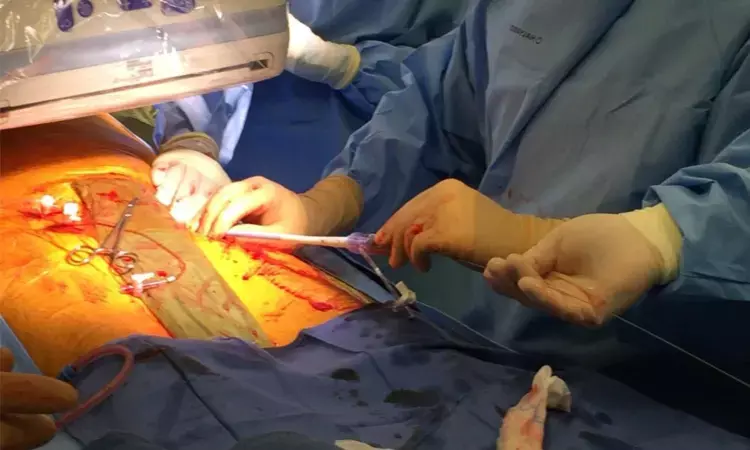- Home
- Medical news & Guidelines
- Anesthesiology
- Cardiology and CTVS
- Critical Care
- Dentistry
- Dermatology
- Diabetes and Endocrinology
- ENT
- Gastroenterology
- Medicine
- Nephrology
- Neurology
- Obstretics-Gynaecology
- Oncology
- Ophthalmology
- Orthopaedics
- Pediatrics-Neonatology
- Psychiatry
- Pulmonology
- Radiology
- Surgery
- Urology
- Laboratory Medicine
- Diet
- Nursing
- Paramedical
- Physiotherapy
- Health news
- Fact Check
- Bone Health Fact Check
- Brain Health Fact Check
- Cancer Related Fact Check
- Child Care Fact Check
- Dental and oral health fact check
- Diabetes and metabolic health fact check
- Diet and Nutrition Fact Check
- Eye and ENT Care Fact Check
- Fitness fact check
- Gut health fact check
- Heart health fact check
- Kidney health fact check
- Medical education fact check
- Men's health fact check
- Respiratory fact check
- Skin and hair care fact check
- Vaccine and Immunization fact check
- Women's health fact check
- AYUSH
- State News
- Andaman and Nicobar Islands
- Andhra Pradesh
- Arunachal Pradesh
- Assam
- Bihar
- Chandigarh
- Chattisgarh
- Dadra and Nagar Haveli
- Daman and Diu
- Delhi
- Goa
- Gujarat
- Haryana
- Himachal Pradesh
- Jammu & Kashmir
- Jharkhand
- Karnataka
- Kerala
- Ladakh
- Lakshadweep
- Madhya Pradesh
- Maharashtra
- Manipur
- Meghalaya
- Mizoram
- Nagaland
- Odisha
- Puducherry
- Punjab
- Rajasthan
- Sikkim
- Tamil Nadu
- Telangana
- Tripura
- Uttar Pradesh
- Uttrakhand
- West Bengal
- Medical Education
- Industry
TAVR Promising Option for Patients with History of Chest Wall Irradiation, study reveals

USA: A recent propensity-matched analysis of five years of data from the National Inpatient Sample (2016-2020) has shed light on transcatheter aortic valve replacement (TAVR) outcomes in patients with a history of chest wall irradiation. This groundbreaking study offers valuable insights into the safety and efficacy of TAVR in a unique patient population, presenting promising implications for clinical practice and patient care.
The analysis, published in Cardiovascular Revascularization Medicine, showed reduced adjusted odds of in-hospital mortality, total hospital charges, length of stay, and inpatient complications in patients undergoing TAVR with a history of chest wall irradiation (C-XRT). TAVR appears to be a viable and safe alternative in this population subgroup.
Chest wall irradiation is a common treatment modality for various thoracic malignancies, but its impact on subsequent cardiac interventions, such as TAVR, has been relatively understudied until now.
Chest radiotherapy has been utilized for treating intra-thoracic and mediastinal tumors. C-XRT survivors frequently develop valvular disease, including aortic stenosis, which eventually requires valve replacement. Previous trials have shown worse outcomes with surgical aortic valve replacement (SAVR). However, TAVR outcomes-related data in patients with C-XRT is limited.
To fill this knowledge gap, Rohan Gajjar, John H. Stroger, Jr. Hospital of Cook County, Chicago, IL, USA, and colleagues aimed to compare the outcomes of TAVR for patients with aortic stenosis with and without a prior history of C-XRT.
For this purpose, the researchers queried the national inpatient sample (NIS) database from 2016 to 2020 to identify adult hospitalizations with TAVR, which were dichotomized based on a C-XRT history using ICD-10-CM codes.
Propensity score matching was performed to derive sex, age, hospital characteristics, and co-morbidities matched controls without a history of C-XRT. The outcomes included inpatient mortality and complications, total hospital charge (THC), and mean length of stay (LOS). Multivariate logistic and linear regression analyzed the outcomes.
The following were the key findings of the study:
- Of 296,670 patients who underwent TAVR between 2016 and 2020, 515 had a history of C-XRT.
- Upon propensity score matching in patients undergoing TAVR, Patients with a history of C-XRT showed significantly lower adjusted odds of in-hospital mortality (adjusted odd ratio [aOR] 0.04), lower mean LOS by 1.6 days, and reduced mean THC (−$74,720).
- Additionally, patients with C-XRT had significantly lower adjusted odds of inpatient complications, mainly acute myocardial infarction, cerebrovascular events, acute kidney injury, acute respiratory failure, need for vasopressors and cardiopulmonary resuscitation, whereas similar odds of complications, including a requirement of intubation, hemodialysis, mechanical ventilation, and cardiogenic shock.
The findings revealed lower odds of inpatient cardiac complications and peri-procedural complications, including cerebrovascular events, in patients with radiation-induced aortic stenosis undergoing TAVR.
In conclusion, the propensity-matched analysis represents a significant step forward in understanding the outcomes of TAVR in patients with a history of chest wall irradiation. By confirming the safety and efficacy of TAVR in this population, the study paves the way for broader adoption of this life-saving intervention, offering new hope for patients with complex cardiac conditions.
Reference:
Gajjar, R., Carlini, G. B., Teaima, T., Aziz, I., Vardar, U., Jamshed, A., Karki, S., Dhar, G., Jolly, N., & Vij, A. (2024). Outcomes of transcatheter aortic valve replacement in patients with history of chest wall irradiation: Propensity matched analysis of five years data from national inpatient sample (2016–2020). Cardiovascular Revascularization Medicine. https://doi.org/10.1016/j.carrev.2024.05.031
Dr Kamal Kant Kohli-MBBS, DTCD- a chest specialist with more than 30 years of practice and a flair for writing clinical articles, Dr Kamal Kant Kohli joined Medical Dialogues as a Chief Editor of Medical News. Besides writing articles, as an editor, he proofreads and verifies all the medical content published on Medical Dialogues including those coming from journals, studies,medical conferences,guidelines etc. Email: drkohli@medicaldialogues.in. Contact no. 011-43720751


